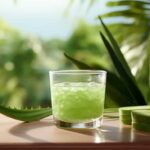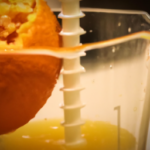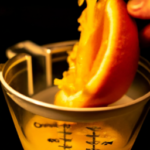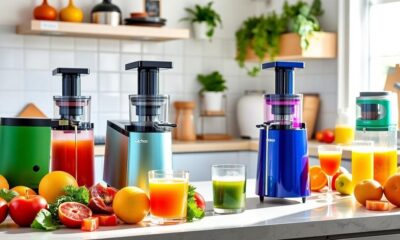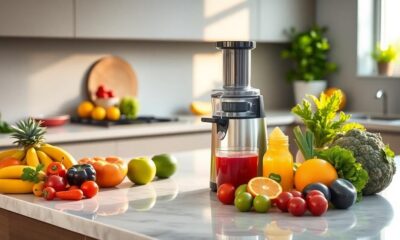Juice Tips and Tricks
How Much Is The Juice Of One Orange
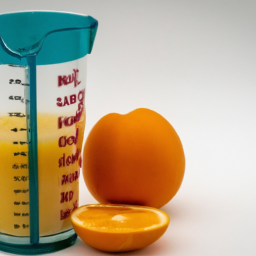
As I was enjoying a refreshing glass of orange juice the other day, I found myself pondering – how much juice can you actually extract from one orange?
This question may seem trivial, but as someone who loves juicing, it’s important to understand the factors that impact juice yield, how to choose the best oranges for juicing, and how to maximize juice yield.
So, I decided to do some research and share my findings with you. It turns out that understanding how much juice one orange yields is not as straightforward as you might think.
There are several factors that can impact juice yield, such as the type of orange, its ripeness, and the juicing method used. In this article, I will explore these factors in more detail and provide tips for getting the most juice out of your oranges.
So, let’s dive in and discover just how much juice one orange can provide.
Key Takeaways
- The amount of juice one orange can yield depends on various factors, such as the type of orange, its ripeness, and the juicing method used.
- Ripe and heavy oranges are preferred for juicing as they yield more juice. Smooth-skinned and firm oranges are also easier to peel and preferred for juicing.
- Cutting oranges in half and using a citrus juicer is the most efficient method for juicing. Rolling oranges before juicing, squeezing leftover pulp, and using a hard surface to break up pulp can help increase juice yield.
- Orange juice can provide numerous health benefits, including antioxidants that protect cells from damage and promote overall health. Incorporating orange juice into your diet is a simple and delicious way to increase your intake of antioxidants and support your overall health.
Factors Affecting Juice Yield
You’ll be surprised at how much juice you can get from one orange depending on factors such as its ripeness and the amount of pressure you apply when squeezing it. Juice extraction techniques also play a significant role in determining the amount of juice you can extract from an orange. For instance, using a citrus juicer will help you extract more juice than squeezing the fruit manually.
The impact of orange maturity on juice yield cannot be overlooked. Ripe oranges yield more juice than unripe ones. Therefore, you should always select ripe oranges if you want to get the most juice.
With this understanding, let’s explore how to choose the best oranges for juicing.
How to Choose the Best Oranges for Juicing
When it comes to choosing the best oranges for juicing, there are a few key points to keep in mind. Firstly, I always look for oranges that feel heavy for their size, as this indicates that they’re likely to be juicy.
Secondly, I opt for oranges with smooth skin, as this suggests that they’re ripe and not damaged.
Finally, I make sure to choose oranges that are firm to the touch, as this indicates that they’re fresh and full of juice.
By following these guidelines, I can ensure that I get the most juice possible out of my oranges when juicing.
Look for heavy oranges
Interestingly enough, the weight of an orange can greatly impact the amount of juice you can extract from it. When choosing oranges for juicing, it’s important to look for heavy ones. The weight of an orange is a good indicator of how much juice it will yield. Heavier oranges tend to be juicier and have thicker skins, which makes them easier to juice.
To give you an idea of how much juice you can extract from an orange, take a look at the table below. The table shows the average weight and juice yield for different types of oranges. As you can see, the heavier the orange, the more juice it yields. So, when you’re at the grocery store trying to choose the best oranges for juicing, be sure to pick up a few heavy ones.
| Type of Orange | Average Weight (grams) | Juice Yield (milliliters) |
|---|---|---|
| Navel | 140 | 100 |
| Valencia | 160 | 120 |
| Blood | 180 | 140 |
| Cara Cara | 200 | 160 |
Choosing juicy oranges with thick skins is just one step in getting the most out of your oranges. Another important factor is choosing oranges with smooth skin. Smooth-skinned oranges are easier to peel, which means you’ll be able to extract more juice. So, the next time you’re at the grocery store, be sure to look for oranges that are both heavy and have smooth skin.
Choose oranges with smooth skin
To get the most out of your oranges, it’s important to pick ones with smooth skin that are easy to peel. The texture of an orange’s skin can indicate a lot about its quality and freshness. Smooth skin is a sign that the orange is ripe and has been well taken care of. Bumpy or rough skin, on the other hand, can indicate that the orange is overripe or has been damaged during transportation.
The importance of smooth skin goes beyond just aesthetics. It also affects the juicing process. Oranges with smooth skin are easier to peel, which means less of the juicy flesh is lost in the process. This is important if you’re trying to get as much juice as possible out of your oranges.
When juicing, it’s also helpful to roll the orange on a hard surface before cutting it open. This can help break up the pulp and release more juice. With these juicing techniques, you’ll be able to get the most out of your smooth-skinned oranges.
When choosing oranges that are firm, it’s important to keep in mind that this can also impact the juicing process.
Choose oranges that are firm
If you want to enjoy a fresh and juicy orange, look for ones that feel firm when you squeeze them gently. This is an important step in choosing ripe oranges and avoiding overripe ones.
When an orange is too soft, it may be overripe and not as juicy. On the other hand, if the orange is too hard, it may not be fully ripe and lack sweetness.
To get the most juice out of your oranges, it’s important to use the right juicing technique. Here are three tips to maximize your yield:
1) Roll the orange on a hard surface before juicing to break down the flesh and release more juice.
2) Cut the orange in half and use a juicer or press to extract the juice.
3) Squeeze the leftover pulp to extract any remaining juice.
With these techniques, you can enjoy a glass of fresh orange juice that is both delicious and nutritious.
When it comes to preparing oranges for juicing, there are a few simple steps you can take to make the process easier.
How to Prepare Oranges for Juicing
First, I always wash my oranges before juicing them to make sure they’re clean and free of any dirt or pesticides.
Then, I cut the oranges in half using a sharp knife to make it easier to squeeze out the juice.
Finally, I roll the oranges on a hard surface to help release even more juice from the fruit.
These simple steps ensure that I get the most juice possible from my oranges and that it’s as fresh and delicious as possible.
Wash the oranges
After rinsing the oranges under cool water, gently scrub the skin with a soft-bristled brush to remove any dirt or residue.
Next, soak the oranges in a bowl of water for about 5 minutes. This will help loosen any remaining dirt or debris from the skin. Soaking also helps to soften the fruit, making it easier to extract juice.
Using a citrus juicer is important when preparing oranges for juicing. Not only does it ensure that you get the maximum amount of juice from each fruit, but it also eliminates the need for hand squeezing, which can be time-consuming and messy.
Once the oranges have been washed and soaked, simply cut them in half and place them in the juicer. The juicer will do the rest, separating the juice from the pulp and seeds.
Cut the oranges in half
Once you’ve washed and soaked them, simply cut the oranges in half like slicing a hot knife through butter, and place them in the juicer. Juice extraction is made easy with the proper equipment options. There are two types of juicers to choose from: centrifugal and masticating. Centrifugal juicers are fast and efficient, but they tend to create more foam and may not extract as much juice from the fruit. Masticating juicers, on the other hand, are slower but tend to extract more juice and preserve more nutrients.
When using a juicer, it’s important to note that the orange should be cut in half with the skin still on. This allows the juice to be extracted from the pulp and skin. The table below provides a breakdown of the different equipment options available for juicing oranges.
| Equipment | Pros | Cons |
|---|---|---|
| Hand held citrus juicer | Easy to use | May not extract as much juice |
| Electric citrus juicer | Quick and efficient | May create more foam |
| Centrifugal juicer | Fast and efficient | May not extract as much juice |
| Masticating juicer | Extracts more juice and preserves nutrients | Slower process |
Rolling the oranges before juicing can help release even more juice from the fruit.
Roll the oranges to release more juice
To enhance the juicing process, it’s advisable to roll the oranges before slicing them in half, as this can help to extract the maximum amount of juice from the fruit. Rolling the oranges helps to break down the cell walls inside the fruit, allowing the juice to flow more freely.
Here are some benefits of rolling oranges and the best tools for juicing oranges:
-
Benefits of rolling oranges:
-
Releases more juice: Rolling the oranges helps to break down the cell walls inside the fruit and release more juice.
-
Saves time: Rolling the oranges before juicing them can save time because you’ll be able to extract more juice from each fruit.
-
Prevents waste: By squeezing out more juice from each orange, you can reduce the amount of waste produced.
-
Best tools for juicing oranges:
-
Handheld citrus juicer: This tool is great for juicing oranges because it allows you to extract the maximum amount of juice from each fruit.
-
Manual juicer: A manual juicer is a good option if you’re juicing a large quantity of oranges because it can handle the volume.
-
Electric juicer: An electric juicer is the best option if you’re juicing a lot of oranges because it’s fast and efficient.
When it comes to juicing oranges, rolling them beforehand can make a big difference in the amount of juice you’re able to extract. However, there are many other popular juicing methods to explore, each with their own benefits and drawbacks.
Popular Juicing Methods
Juicing is a popular way to consume fruits and vegetables, and according to a survey, 43% of Americans prefer using a juicer to make their juice. There are several popular juicing methods that people use to extract juice from fruits and vegetables. Some of the most common juicing equipment includes centrifugal juicers, masticating juicers, and citrus juicers.
Centrifugal juicers are the most popular type of juicer and are great for juicing hard fruits and vegetables. They work by using a spinning blade to shred the produce into small pieces, and then a mesh filter separates the juice from the pulp. Masticating juicers, on the other hand, use a slow and steady process to extract juice. They work by grinding the produce into a pulp and then squeezing the juice out. Citrus juicers are designed specifically for juicing oranges, lemons, limes, and grapefruits. They work by using a reamer to extract the juice from the citrus fruit. Juicing can also be a great way to aid in weight loss, as it can help increase your intake of fruits and vegetables, which are low in calories and high in nutrients.
If you’re wondering how much juice you can expect from one orange, it depends on the size and type of orange. On average, one medium-sized orange can yield about 1/4 to 1/3 cup of juice. However, some types of oranges may yield more or less juice than others. Now that we’ve covered popular juicing methods, let’s dive into how to get the most juice out of an orange.
How Much Juice Can You Expect from One Orange?
If you’re looking to add a burst of citrus flavor to your morning routine, you’ll be happy to know that a medium-sized orange can yield a quarter to a third cup of freshly squeezed juice. However, the amount of juice you get from an orange can vary depending on different factors such as juice extraction techniques, acidity levels in oranges and juice yield.
When it comes to juice extraction techniques, using a juicer can yield more juice than squeezing by hand. Also, the level of acidity in an orange can affect the amount of juice yield. Oranges with higher acidity levels tend to yield more juice than those with lower acidity levels.
While the amount of juice you get from one orange may not seem like much, it can add up quickly if you’re juicing multiple oranges.
In the next section, we’ll discuss some tips for maximizing juice yield.
Tips for Maximizing Juice Yield
You’ll be amazed at how much more juice you can get out of your oranges by gently rolling them on your countertop before juicing them. This simple technique helps to break down the individual juice sacs and release more juice.
Another tip for maximizing juice yield is to use a citrus press instead of just squeezing the oranges by hand. A citrus press can extract more juice and is also more efficient, saving you time and effort. When using a citrus press, it’s important to cut the oranges in half and place them cut-side-down in the press. Then, simply apply pressure to the handle and let the press do the work for you.
With these tips, you can extract the most juice possible from your oranges and enjoy a refreshing glass of orange juice. As for storing orange juice, there are a few steps you can take to keep it fresh.
Storing Orange Juice
Now that we’ve covered some tips to maximize the juice yield of an orange, let’s talk about the best way to store that freshly squeezed juice.
Storing orange juice properly is important to maintain its flavor and prevent oxidation. To keep orange juice fresh, it’s best to store it in an airtight container in the refrigerator. This will slow down the oxidation process, which can cause the juice to turn sour.
It’s also important to keep the juice away from light, as UV rays can break down the vitamins in the juice. To further prevent oxidation, you can add a small amount of lemon juice to the orange juice. The citric acid in lemon juice can inhibit the oxidation process and keep the juice fresher for longer.
Did you know? Orange juice can be stored in the freezer for up to six months! Just be sure to use a freezer-safe container and leave some room for expansion.
Fun Fact: Glass bottles are the best containers for storing orange juice, as they do not release any chemicals that can affect the flavor of the juice.
Pro Tip: If you want to keep orange juice fresh for a few extra days, try adding a pinch of salt to the juice before storing it in the fridge. The salt will help to preserve the juice and prevent it from spoiling too quickly.
Now that we know how to properly store our freshly squeezed orange juice, let’s move on to the next step: using it in recipes.
Using Orange Juice in Recipes
I love using orange juice in my cooking and baking. It adds a bright and refreshing flavor to dishes. One of my favorite ways to use orange juice is in drinks, such as smoothies and cocktails.
Additionally, it can be used in sauces and marinades to add a tangy kick to meat or vegetables. It can also be used in baked goods such as muffins and cakes for a burst of citrus flavor.
Drinks
Let’s quench our thirst with a refreshing glass of orange juice – do you know how much juice we can get from just one orange? Well, it actually depends on the size and ripeness of the orange. On average, a medium-sized orange can yield around 1/3 to 1/2 cup of juice. However, if you want to get the most juice out of your oranges, try using juicing techniques like rolling the orange on a hard surface to break the individual juice sacs, or microwaving the orange for a few seconds to soften it up before squeezing. Additionally, using a dedicated citrus juicer can help extract every last drop, maximizing the yield from each fruit. Given the varying availability of fresh oranges and market fluctuations, the price of orange juice today can play a role in determining whether making your own juice at home is more cost-effective than buying prepackaged options. Regardless, the natural sweetness and vibrant flavor of freshly squeezed juice can be well worth the effort for many!
If you’re looking for alternative citrus fruits to try, there are plenty of options that can also make delicious drinks. Grapefruits, lemons, and limes are all great for making juices and can add a unique twist to your usual orange juice. Keep in mind that these citrus fruits may yield different amounts of juice compared to oranges, so adjust accordingly.
Now, let’s move on to the next section about sauces and marinades. Did you know that orange juice can also be a great ingredient for adding flavor to your dishes?
Sauces and marinades
You can add a burst of tangy sweetness to your dishes by incorporating the zesty flavor of oranges into your sauces and marinades. Oranges are a versatile fruit that can be used in both savory pairings and sweet applications.
Here are some ways to incorporate oranges into your cooking:
- Use orange juice as a base for a marinade for chicken or fish
- Add orange zest to a vinaigrette for a bright, citrusy flavor
- Mix orange juice with honey and soy sauce for a sweet and savory glaze for roasted vegetables or meats
Incorporating oranges into your sauces and marinades can take your cooking to the next level. But oranges can also be used in baked goods for a sweet and tangy twist.
Baked goods
I hope you enjoyed learning about sauces and marinades in the previous section. Now, let’s move on to baked goods and explore the creative uses and pairing suggestions for orange juice.
Orange juice is a versatile ingredient that can be used in a variety of baked goods, from cakes and muffins to breads and cookies. Its tangy and sweet flavor adds a citrusy twist to traditional recipes. You can swap water or milk with orange juice in your baked goods recipe to give it a unique flavor.
If you’re feeling adventurous, try adding orange juice to your frosting or glaze for an extra burst of flavor. For pairing suggestions, orange juice goes well with other citrus flavors like lemon or lime. You can also pair it with ingredients like nuts, chocolate, and spices like cinnamon or ginger for a delicious flavor combination.
As we move on to the next section, let’s not forget about the health benefits of orange juice.
Health Benefits of Orange Juice
I love drinking orange juice, not only because of its refreshing taste, but also because of its numerous health benefits.
One of the most well-known benefits of orange juice is its high vitamin C content, which helps boost immunity and heal wounds.
Additionally, orange juice contains antioxidants that protect cells from damage and promote overall health.
Its hydrating properties can help keep you feeling refreshed and energized throughout the day.
Vitamin C content
The vitamin C content in the juice of one orange is significant. Benefits of vitamin C include a strengthened immune system, improved skin health, and reduced risk of chronic diseases. The recommended daily intake of vitamin C for adults is 75-90mg.
One medium-sized orange contains around 70mg of vitamin C, which means that drinking a glass of orange juice can help you meet your daily vitamin C needs. In comparison to other fruits, oranges are one of the best sources of vitamin C. For instance, a medium-sized orange contains more vitamin C than a cup of strawberries or a kiwi.
However, oranges are not the only fruit that contains vitamin C. Other fruits like guavas, papayas, and pineapples are also excellent sources of this vitamin. Moving on to the next section, antioxidants are another important component of orange juice that contribute to its health benefits.
Antioxidants
You’ll be pleased to know that antioxidants are present in orange juice, which can lower your risk of chronic diseases like cancer and heart disease. Antioxidants are compounds that help protect your cells from damage caused by free radicals. Free radicals are unstable molecules that can build up in your body and cause damage to cells, DNA, and proteins. The benefits of antioxidants include reducing inflammation, improving immune function, and protecting against chronic diseases.
There are many sources of antioxidants, including fruits, vegetables, nuts, and seeds. However, orange juice is a particularly good source of antioxidants because it contains high levels of vitamin C, flavonoids, and carotenoids. Vitamin C is a powerful antioxidant that can help boost your immune system and protect against infections. Flavonoids and carotenoids are other types of antioxidants that can help protect your cells from damage. Incorporating orange juice into your diet is a simple and delicious way to increase your intake of antioxidants and support your overall health.
Drinking enough fluids is essential for staying hydrated and maintaining optimal health.
Hydration
Staying hydrated is crucial for feeling energized and refreshed throughout the day. Water makes up a considerable portion of our body, and it plays a vital role in maintaining body temperature, transporting nutrients, and detoxifying wastes.
Drinking enough water is essential for the optimal functioning of our body, and it comes with numerous benefits. One of the most crucial benefits of hydration is that it helps in maintaining the balance of fluids in our body.
Dehydration can lead to various health issues, such as headaches, fatigue, and even kidney problems. Drinking enough water throughout the day can help prevent these issues and keep us feeling our best. Additionally, staying hydrated can improve our skin’s appearance, aid in digestion, and boost our immune system.
Therefore, it’s crucial to recognize the importance of staying hydrated and make sure we drink enough water to keep our bodies functioning at their best.
Frequently Asked Questions
How long does it take to juice one orange?
After investigating, I’ve found that juicing one orange can take anywhere from 30 seconds to 2 minutes depending on juicing techniques and orange juice extraction methods used. It’s important to select a juicy orange to maximize yield.
Can you juice an orange with the peel still on?
Juicing an orange with the peel on is possible, but it may produce a bitter taste and a gritty texture. However, leaving the peel on can provide additional nutritional benefits, such as fiber and vitamin C.
What is the best time of day to juice an orange for maximum juice yield?
Juicing oranges at any time of day can yield maximum juice, but using different techniques can affect the amount extracted. Freshly squeezed orange juice has numerous benefits, including high vitamin C content and improved digestion.
Are there any types of oranges that should not be used for juicing?
When it comes to juicing oranges, it is best to use varieties that are juicy and have thin skin. Navel and Valencia oranges are great options. Alternatively, you can also try juicing other fruits like grapefruits or lemons.
Can you freeze freshly squeezed orange juice for later use?
Yes, freshly squeezed orange juice can be frozen for later use. However, it may lose some of its nutritional value. It’s best to consume the juice as soon as possible to reap the full benefits.
Conclusion
Overall, juicing oranges is a great way to enjoy a refreshing and healthy drink. While the amount of juice you can expect from one orange may vary based on factors such as the variety of orange and the juicing method used, typically one orange will yield around 1/3 to 1/2 cup of juice.
To maximize your juice yield, choose ripe, juicy oranges and use a juicer or citrus press. Some may argue that juicing removes important fiber from oranges and therefore it’s better to eat the whole fruit. While it’s true that juicing does remove some of the fiber, it also provides a concentrated source of vitamins, minerals, and antioxidants that can be easily absorbed by the body.
Plus, using a juicer or citrus press allows you to extract more juice from the orange than you might be able to by hand, making it a convenient and efficient way to get your daily dose of vitamin C. So, go ahead and enjoy a glass of fresh-squeezed orange juice today!
Cindy thoroughly researches juicing trends, techniques, and recipes to provide readers with practical advice and inspiration. Her writing style is accessible, engaging, and designed to make complex concepts easy to understand. Cindy’s dedication to promoting the advantages of juicing shines through her work, empowering readers to make positive changes in their lives through the simple act of juicing.
Juice Tips and Tricks
How to Make Aloe Vera Juice Taste Better

Tired of the strong flavor of aloe vera juice? No problem, we’ve got the answer for you.
In this article, we’ll share some tips and tricks to make your aloe vera juice taste better. We have tried and tested various methods to enhance the flavor without compromising the health benefits.
From choosing the right juice to adding natural sweeteners and infusing with fruits and herbs, we’ve got all the information you need to transform your aloe vera juice into a delightful and refreshing beverage.
Let’s dive in!
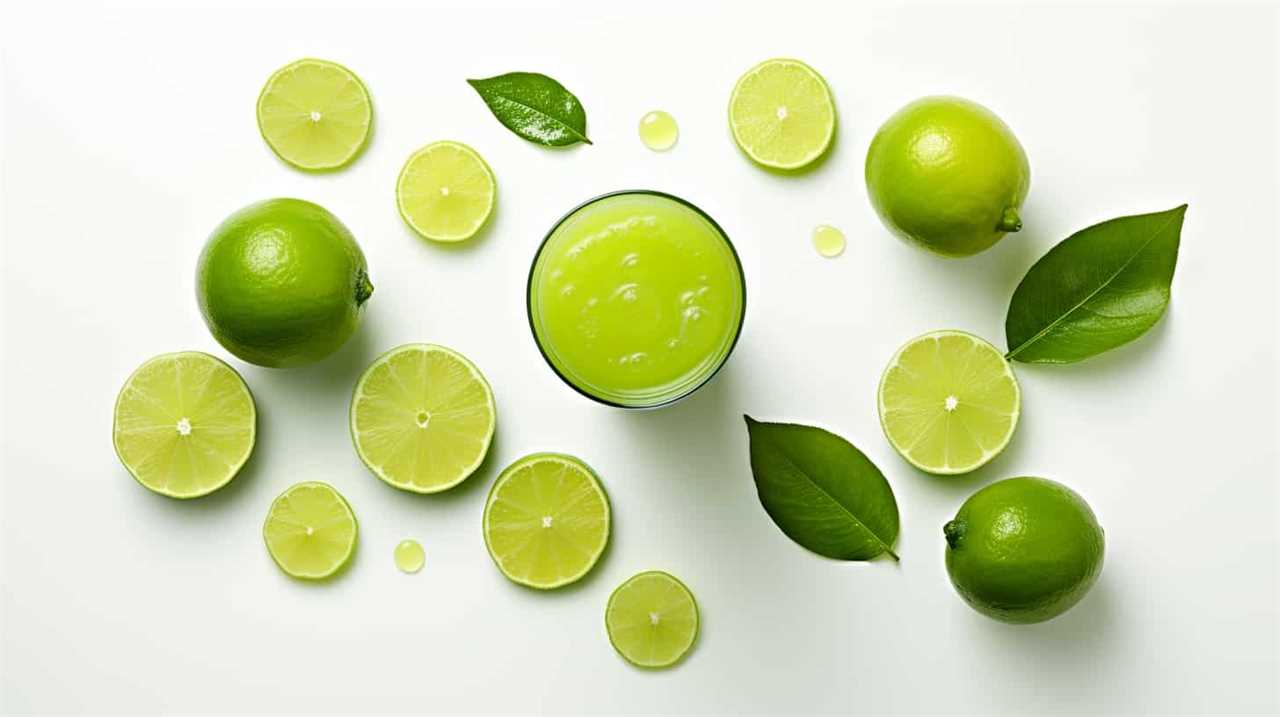
Key Takeaways
- Choose a reputable brand of aloe vera juice that prioritizes quality and uses organic, pure aloe vera.
- Avoid brands that contain added sugars or artificial ingredients.
- Use natural sweeteners like honey, agave syrup, or stevia to enhance the taste of aloe vera juice.
- Experiment with adding fruits, herbs, and other juices to create unique flavor combinations and enhance the health benefits of aloe vera juice.
Choosing the Right Aloe Vera Juice
We can enhance our experience with aloe vera juice by selecting the right brand and type for our preferences. When it comes to finding a reputable brand, it’s important to do some research and read reviews from other consumers. Look for brands that prioritize quality and use organic, pure aloe vera without any added sugars or artificial ingredients. Understanding the health benefits of aloe vera juice is also crucial in making the right choice. Aloe vera is known for its soothing properties, aiding digestion, promoting skin health, and boosting the immune system. By choosing a high-quality brand, we can ensure that we’re getting the maximum benefits from our aloe vera juice.
Now that we know how to choose the right brand, let’s move on to the next step of adding natural sweeteners.
Adding Natural Sweeteners
To enhance the flavor of our aloe vera juice, we can add natural sweeteners such as honey or agave syrup. Using alternative sweeteners not only adds sweetness but also brings unique flavors to the juice. Here are some options to consider:
- Stevia: A natural sweetener derived from the Stevia plant, it’s a zero-calorie alternative to sugar.
- Maple Syrup: This natural sweetener adds a rich and earthy flavor to the aloe vera juice.
- Dates: Pureed dates can be used to sweeten the juice while also providing essential nutrients like fiber.
In addition to using alternative sweeteners, we can enhance the flavor of aloe vera juice by adding spices and extracts. Cinnamon, ginger, or vanilla extract can add warmth and depth to the taste. By experimenting with different combinations of these natural sweeteners, spices, and extracts, we can create a flavor profile that suits our preferences.
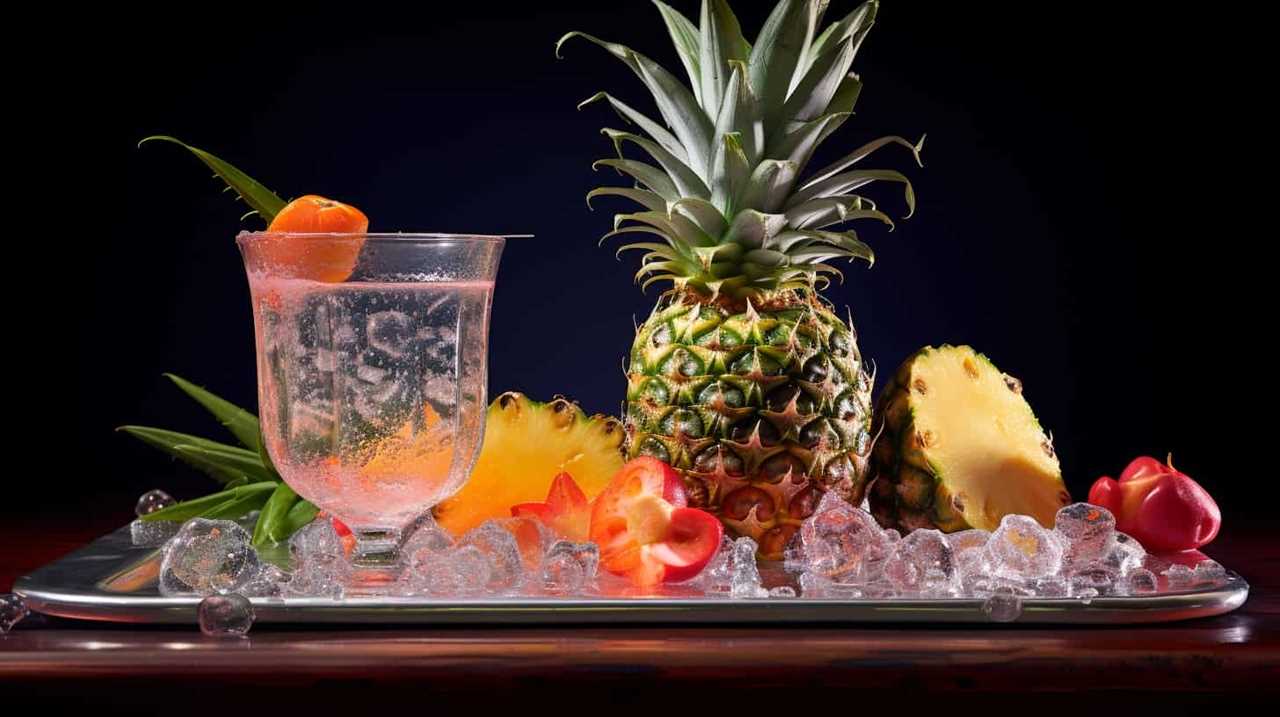
Now, let’s move on to the next section and learn how to infuse aloe vera juice with fruits and herbs to further enhance its taste.
Infusing With Fruits and Herbs
As we explore ways to make our aloe vera juice taste better, one option to consider is infusing it with fruits and herbs. Creating unique aloe vera blends by adding fruits and herbs not only enhances the flavor but also adds a touch of freshness and complexity to the juice. For example, combining aloe vera juice with lemon, mint, or berries can create a refreshing drink that’s both delicious and packed with additional nutrients. It’s similar to the ease of making lemonade with bottled juice—quick, convenient, and customizable to suit your preferences. By experimenting with different fruit and herb combinations, you can elevate your aloe vera juice experience while still reaping its health benefits.
Fruits like strawberries, pineapple, or citrus can add a burst of sweetness, while herbs like mint, basil, or ginger can provide a subtle yet refreshing twist. Exploring the benefits of herbal infusions can also be beneficial for our health. For example, adding a few sprigs of lavender can promote relaxation and reduce stress. Additionally, infusing aloe vera juice with rosemary can aid digestion and boost the immune system.
Blending With Other Juices
Let’s try mixing aloe vera juice with different fruit juices to create delicious and refreshing blends. Blending aloe vera juice with other fruits not only enhances its taste but also adds nutritional benefits to your drink. Here are three fruit juices that you can mix with aloe vera juice:

- Orange juice: Combining aloe vera juice with orange juice not only adds a tangy flavor but also boosts your intake of vitamin C, which is essential for a strong immune system.
- Pineapple juice: Mixing aloe vera juice with pineapple juice creates a tropical blend that isn’t only refreshing but also helps in digestion. Pineapple contains bromelain, an enzyme that aids in breaking down proteins and promoting better digestion.
- Watermelon juice: Blending aloe vera juice with watermelon juice creates a hydrating and refreshing combination. Watermelon is rich in water content and contains electrolytes that can help replenish your body’s fluids.
Experimenting With Flavor Combinations
While we can try various flavor combinations with aloe vera juice, it’s important to find the right balance to enhance its taste. Experimenting with different flavors can’t only make the juice more enjoyable but also enhance its health benefits.
Aloe vera juice is known for its numerous health benefits, such as boosting digestion, promoting hydration, and supporting the immune system. By adding complementary flavors, we can create a refreshing summer drink that not only tastes great but also provides a nutritional boost.
Some popular flavor combinations include mixing aloe vera juice with citrus fruits like lemon or orange, adding a splash of coconut water for a tropical twist, or combining it with cucumber and mint for a refreshing and cooling effect.
Don’t be afraid to get creative and find the flavor combination that suits your taste buds best!
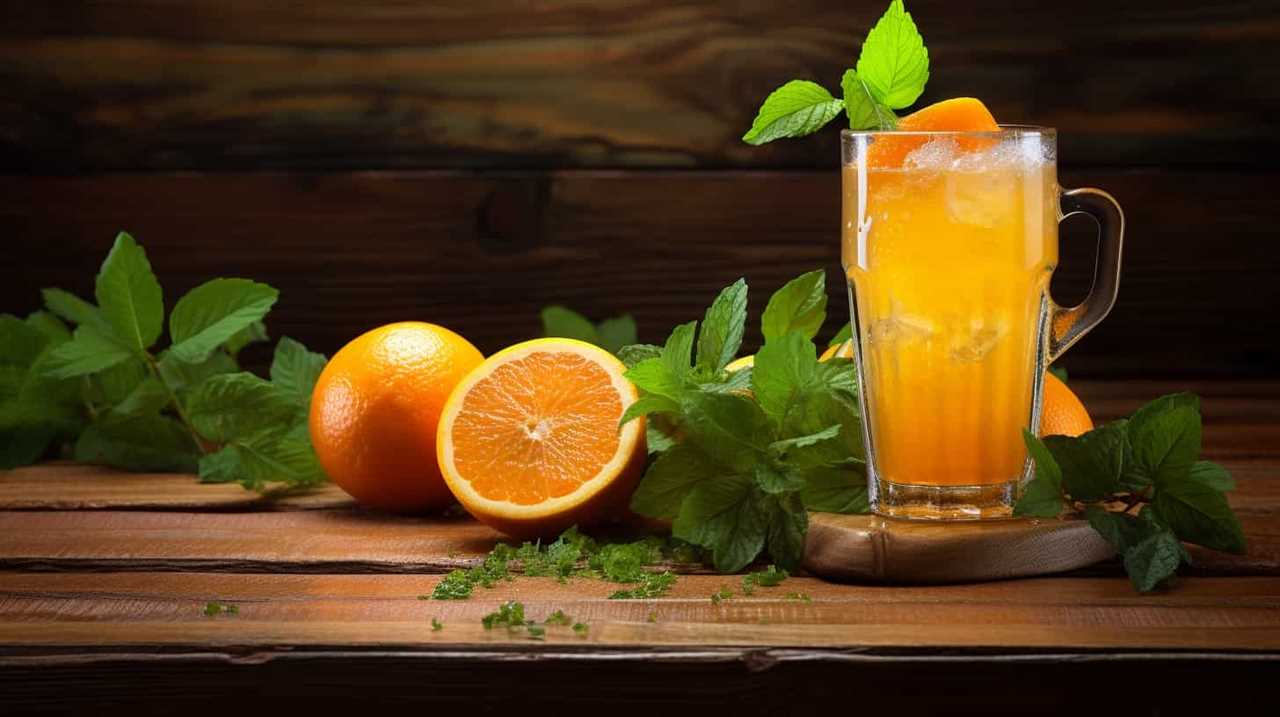
Frequently Asked Questions
Can I Use Store-Bought Aloe Vera Gel Instead of Fresh Aloe Vera for Making Juice?
Yes, you can use store-bought aloe vera gel instead of fresh aloe vera for making juice. However, it’s important to note that fresh aloe vera juice may have more health benefits due to its higher nutrient content.
How Long Can I Store Aloe Vera Juice in the Refrigerator?
Aloe vera juice can be stored in the refrigerator for up to a week. Refrigeration helps maintain the longevity and freshness of the juice, preserving its beneficial properties. It’s important to store the juice in an airtight container to prevent contamination and maintain its quality. Similarly, you might wonder *how long ginger juice lasts*; typically, fresh ginger juice can be refrigerated for about 1–2 weeks as well. Both aloe vera and ginger juices are best consumed within their shelf life to ensure maximum potency and health benefits. Additionally, freezing either juice can extend their shelf life, though some loss of nutrients and potency may occur during the process. When thinking about *how long fresh juice lasts*, it’s crucial to check for signs of spoilage, such as changes in smell, taste, or color, before consuming. To enjoy the best results, it’s always recommended to use fresh ingredients and properly store the juice to ensure you’re getting the most out of its health benefits.
Can Aloe Vera Juice Help With Digestive Issues?
Aloe vera juice can potentially help with digestive issues when taken in appropriate dosages. However, it is important to note that there may be potential side effects. It is always best to consult with a healthcare professional before starting any new supplement regimen.
Can I Use Artificial Sweeteners Instead of Natural Sweeteners in My Aloe Vera Juice?
Using artificial sweeteners in aloe vera juice may affect its taste and potential health benefits. However, natural sweeteners like honey or stevia can enhance the flavor without compromising its nutritional value.

Is It Safe to Drink Aloe Vera Juice Every Day?
Drinking aloe vera juice daily can have numerous benefits, such as improving digestion and boosting the immune system. However, consuming it regularly may also lead to potential side effects like diarrhea or stomach cramps.
Conclusion
In conclusion, making aloe vera juice taste better is easy and enjoyable.
By choosing the right aloe vera juice and adding natural sweeteners, infusing with fruits and herbs, blending with other juices, and experimenting with flavor combinations, you can create a delightful and refreshing drink.
So go ahead and unleash your creativity in the kitchen, and transform your aloe vera juice into a sensational elixir that will transport your taste buds to paradise.
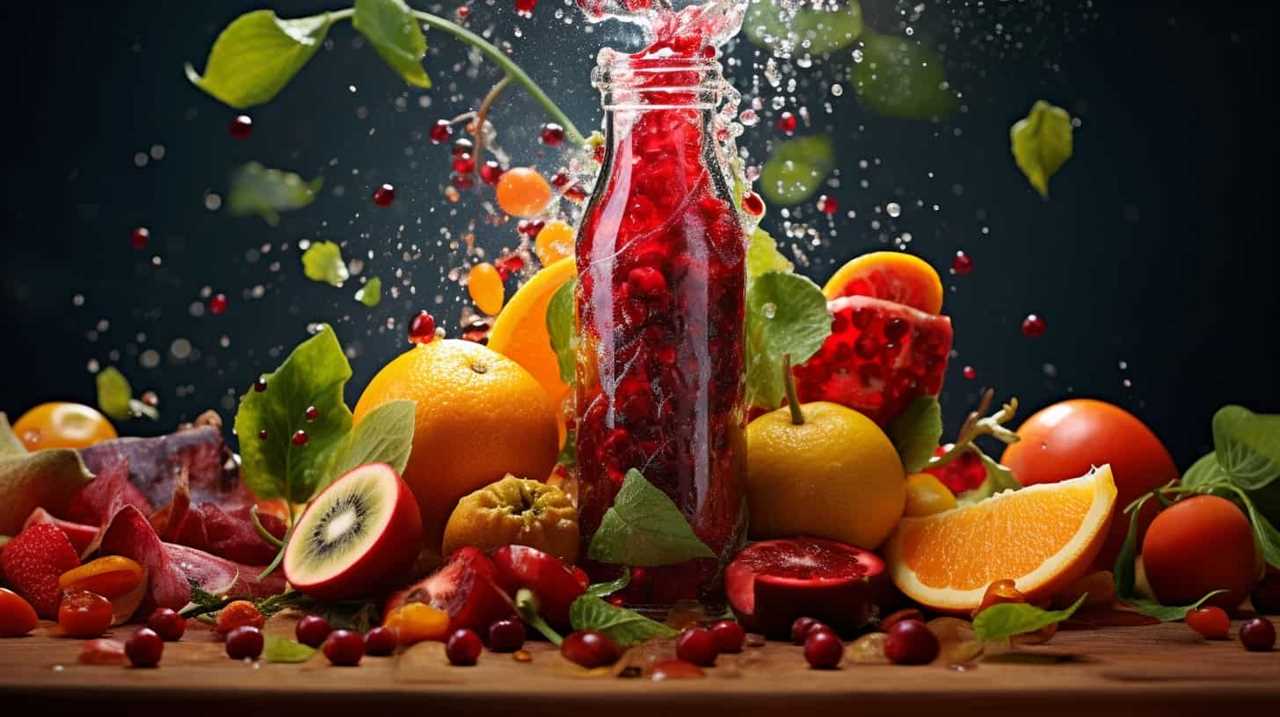
Susannah expertise lies in researching and compiling evidence-based content on juicing, nutrition, and overall health. She is committed to ensuring that The Juicery World offers accurate, up-to-date, and trustworthy information to empower readers to take control of their health. Susannah’s goal is to inspire individuals to embrace juicing as a way to nourish their bodies and live their best lives.
Juice Tips and Tricks
How to Make a Glass of Lemonade With Bottled Lemon Juice

Are you craving a cool glass of lemonade to quench your thirst? Look no further! Try out our perfect recipe using bottled lemon juice that will surely please your taste buds.
In this article, we’ll guide you through the process of creating a tangy and sweet concoction that will leave you feeling refreshed and satisfied.
So grab your ingredients and let’s get started on this delightful journey of serving ourselves and others a glass of pure lemony goodness.
Key Takeaways
- Consider the storage of the bottled lemon juice (dark glass or plastic bottles, protect from light exposure, check expiration date)
- Choose a suitable pitcher and fresh lemons for enhanced flavor
- Store the lemonade concentrate in the refrigerator to maintain freshness
- Adjust the sweetness and tartness to taste with sugar or more lemon juice, and experiment with different sweeteners or additional flavors.
Choosing the Right Bottled Lemon Juice
What are the key factors we should consider when selecting the right bottled lemon juice for our lemonade?

One important factor is how the lemon juice is stored. Look for bottles that are made of dark glass or plastic, as they help protect the juice from light exposure, which can degrade its quality. It’s also important to check the expiration date to ensure freshness.
Another benefit of using bottled lemon juice is convenience. It saves time and effort compared to squeezing fresh lemons. Additionally, bottled lemon juice provides consistent flavor, as the acidity levels are standardized.
When selecting a brand, consider reading reviews and checking for certifications, such as organic or non-GMO.
Gathering the Necessary Ingredients and Tools
How can we gather all the necessary ingredients and tools to make a glass of lemonade with bottled lemon juice? First, we’ll need to collect bottled lemon juice, sugar, and cold water, as well as a pitcher and a spoon for mixing. If you prefer extra flavor, you can also gather ice and optional add-ins like mint or soda water. While preparing the lemonade, it’s easy to understand why some people wonder about other citrus drinks and may ask, “how many oranges per gallon” are needed when making orange juice instead. Once everything is assembled, combine the lemon juice, sugar, and water in the pitcher, stirring until the sugar dissolves. Feel free to adjust the sweetness or tartness to your liking, and don’t forget to add ice or any optional add-ins for an extra refreshing touch. This process might even make you curious about how much juice from oranges is needed when making fresh orange juice compared to using bottled citrus products. Once your lemonade is ready, pour it into a glass and enjoy the refreshing taste. This simple recipe can inspire you to try other homemade juices, such as learning **how to make pear juice** or experimenting with other fruit combinations. Whether you’re using fresh fruits or bottled options, creating your own beverages is a fun and rewarding way to personalize your drinks.
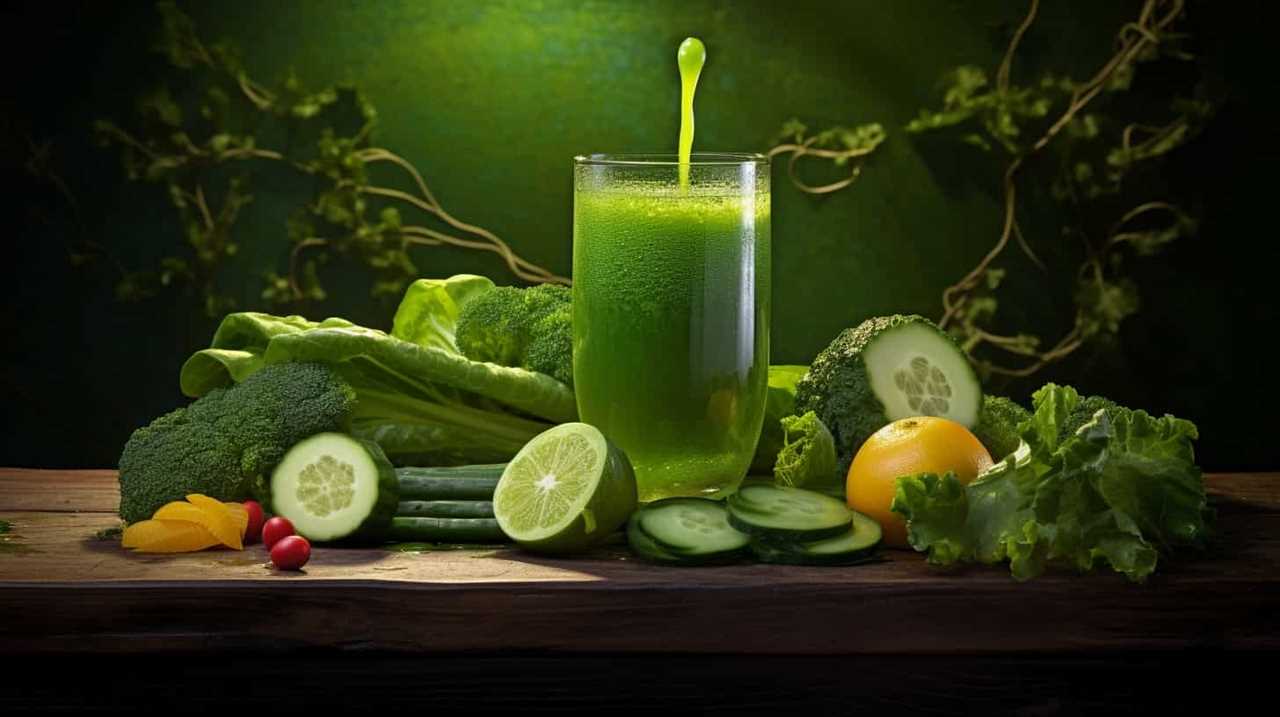
It’s important to start with the right pitcher. Look for a pitcher that’s made of glass or BPA-free plastic, as these materials won’t affect the taste of the lemonade. The pitcher should also have a lid or cover to keep the lemonade fresh and prevent spills.
Now, let’s talk about the lemons. While bottled lemon juice is convenient, using fresh lemons instead can elevate the flavor of your lemonade. Choose lemons that are firm and have a bright yellow color. Give them a gentle squeeze to ensure they’re juicy. To extract the juice, you’ll need a citrus juicer or a reamer. These tools make it easy to get every last drop of juice from the lemons.
Mixing the Lemonade Concentrate
To start mixing the lemonade concentrate, we’ll slowly pour the bottled lemon juice into the pitcher. It’s important to choose the right container for the lemonade concentrate. A pitcher with a lid or a tightly sealed container will help maintain the freshness and prevent any spills or leaks. Once the lemon juice is in the pitcher, we can move on to the next step of adding water and sweetener.
To ensure the lemonade concentrate stays fresh, it’s essential to store it properly. Keep the pitcher in the refrigerator to maintain its cool temperature and prevent any bacteria growth. If you have any leftover concentrate, transfer it to a smaller container with an airtight lid before refrigerating. This will help retain its flavor and prevent any contamination.

Now that we’ve mixed the lemonade concentrate, it’s time to adjust the sweetness and tartness to taste.
Adjusting the Sweetness and Tartness to Taste
We can adjust the sweetness and tartness of the lemonade to taste by adding more sugar or lemon juice, respectively. If you prefer a sweeter lemonade, simply add more sugar and stir until it dissolves completely. You can experiment with different sweeteners such as honey or agave syrup to find the perfect balance of sweetness.
On the other hand, if you want a tangier lemonade, add more lemon juice gradually, tasting as you go until it reaches your desired level of tartness.
Additionally, you can get creative with your lemonade by adding flavors like fresh mint leaves or a hint of lavender. These additions can elevate the flavor profile and create a more refreshing and unique experience.

Now that we’ve adjusted the sweetness and tartness of our lemonade, let’s move on to serving and enjoying your refreshing glass of lemonade.
Serving and Enjoying Your Refreshing Glass of Lemonade
Now let’s sit back, relax, and savor our refreshing glass of lemonade.
When it comes to serving and enjoying this delightful drink, there are a few techniques and garnishing options to consider.
Firstly, serving your lemonade chilled is essential for maximum enjoyment. Ensure that you have chilled glasses or add ice cubes to the glasses before pouring the lemonade.

To add a touch of elegance, you can garnish your lemonade with a slice of lemon on the rim of the glass. For an extra burst of flavor, you could also add a sprig of fresh mint or a few berries.
Remember to gently stir the lemonade before serving to evenly distribute the flavors.
Now, take a sip, feel the refreshing tang of lemon, and let the sweet and tart flavors dance on your taste buds.
Cheers!
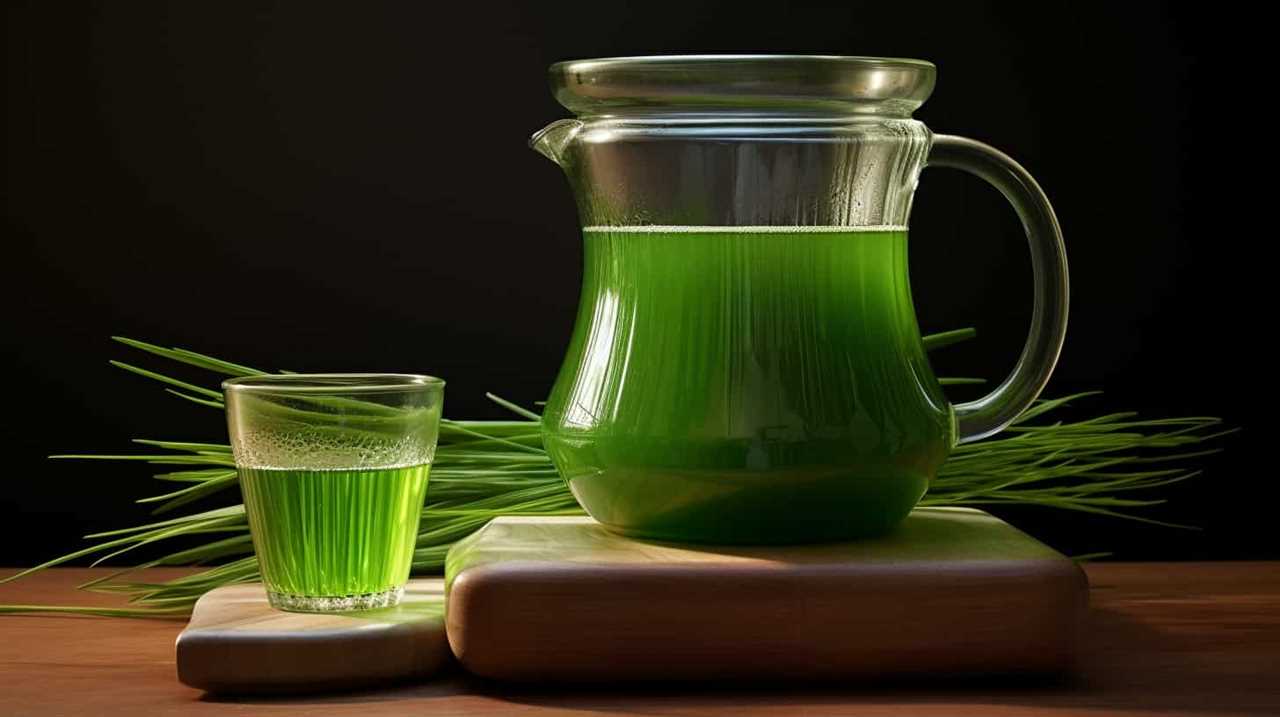
Frequently Asked Questions
Can I Use Fresh Lemons Instead of Bottled Lemon Juice?
Fresh lemons offer numerous benefits over bottled lemon juice. The taste of fresh lemons is unparalleled, providing a vibrant and tangy flavor. Incorporating fresh lemons into your lemonade will elevate its taste and give it a refreshing and authentic twist.
Can I Substitute Sugar With a Different Sweetener?
Substituting sweeteners in lemonade can enhance the flavor and offer health benefits. We’re knowledgeable about alternative sweeteners and can provide precise, detailed instructions on using them in place of sugar.
How Long Does the Lemonade Concentrate Need to Chill in the Refrigerator?
The chilling time for the lemonade concentrate in the refrigerator is typically around 1-2 hours. Using bottled lemon juice offers the benefit of convenience and consistent flavor for a refreshing glass of lemonade.
Can I Add Other Fruits or Flavors to the Lemonade?
Sure, we can definitely add different fruits or flavors to our lemonade. It’s a great way to experiment with unique flavors and create refreshing, personalized drinks. The possibilities are endless!

How Long Does the Lemonade Stay Fresh in the Refrigerator?
Lemonade made with bottled lemon juice can stay fresh in the refrigerator for about 5-7 days. To maximize shelf life, store it in an airtight container and keep it chilled.
Conclusion
And so, with a few simple steps and the right ingredients, a glass of refreshing lemonade is born.
Like a symphony of flavors dancing on your taste buds, this tangy elixir quenches thirst and brings joy on a hot summer day.
Just a sip transports you to a world of citrusy delight, where the sweetness and tartness blend harmoniously.

So go ahead, indulge in the art of lemonade-making and savor every drop of this sun-kissed nectar.
Cheers to the perfect glass of lemonade!
Susannah expertise lies in researching and compiling evidence-based content on juicing, nutrition, and overall health. She is committed to ensuring that The Juicery World offers accurate, up-to-date, and trustworthy information to empower readers to take control of their health. Susannah’s goal is to inspire individuals to embrace juicing as a way to nourish their bodies and live their best lives.
Juice Tips and Tricks
How to Know if Orange Juice Is Bad

We’ve all been in that situation before – reaching for a glass of orange juice and hesitating, unsure if it’s still okay to drink. Fear not! This article will give you the knowledge you need to determine for sure if your orange juice is still fresh or if it’s gone bad.
With a blend of scientific precision and practical tips, we’ll explore color changes, strange smells, off taste, texture changes, and mold or growth that may indicate spoilage.
Let’s dive in and serve ourselves a refreshing glass of certainty!
Key Takeaways
- Color changes in orange juice can indicate a loss of freshness and shelf life extension, but it doesn’t necessarily mean the juice is bad.
- Unusual or off-putting odors in orange juice, such as sour or fermented scents, can be a sign of poor quality.
- An off taste in orange juice, such as sour, bitter, or fermented flavors, suggests that the juice is spoiled.
- Texture changes in orange juice, such as pulp separation or a thicker consistency, can occur as the juice ages, so it’s important to consume it before the expiration date.
Color Changes in Orange Juice
We should be aware that color changes can indicate whether orange juice is bad.

When it comes to orange juice, color is a crucial factor to consider. As oranges are exposed to air, an oxidation process occurs, which leads to changes in color. Fresh orange juice has a vibrant orange hue, indicating its freshness and high nutritional value.
However, as time passes, the juice may undergo a color change, turning dull or brownish. This change in color is a result of the oxidation process, which affects the flavor and quality of the juice. It’s important to note that while a change in color doesn’t necessarily mean the juice is bad, it does indicate that the juice is losing its freshness and shelf life extension.
Therefore, it’s advisable to consume orange juice when it’s at its freshest, as indicated by its vibrant orange color.
Strange Smells in Orange Juice
When it comes to evaluating orange juice, we should be cautious of any strange smells or odors. A fresh, pleasant smell is indicative of good quality orange juice. However, if you notice any unusual or off-putting odors, it may be a sign that the juice has gone bad. These smells can range from a sour or fermented scent to a rancid or moldy aroma.

It’s important to note that while some natural variations in scent can occur due to the specific variety of oranges used, any strong or unpleasant smells should raise concerns. If you have citrus fruit allergies, it’s especially important to pay attention to the smell of orange juice, as it could indicate the presence of spoilage or contamination.
Ensuring the quality of orange juice is essential as it’s a popular beverage known for its health benefits, including being rich in vitamin C and antioxidants.
Off Taste of Orange Juice
Our taste buds can detect even the slightest hint of an off taste in orange juice, which can indicate that it has gone bad. The taste of orange juice should be fresh, tangy, and slightly sweet. If it tastes sour, bitter, or fermented, it’s likely spoiled.
One common cause of an off taste in orange juice is the use of overripe oranges. When oranges become overripe, their flavor profile changes, resulting in a less pleasant taste. Another factor to consider is the expiration date. Orange juice that has passed its expiration date is more likely to develop an off taste. It’s important to check the expiration date before consuming orange juice to ensure its freshness and quality. Additionally, improper storage conditions, such as leaving the juice at room temperature for extended periods, can lead to the development of unpleasant flavors. Storing orange juice in the refrigerator helps maintain its freshness for longer. For those exploring different juice options, aloe vera juice flavor tips suggest pairing tart juices with milder flavors to balance the overall taste.
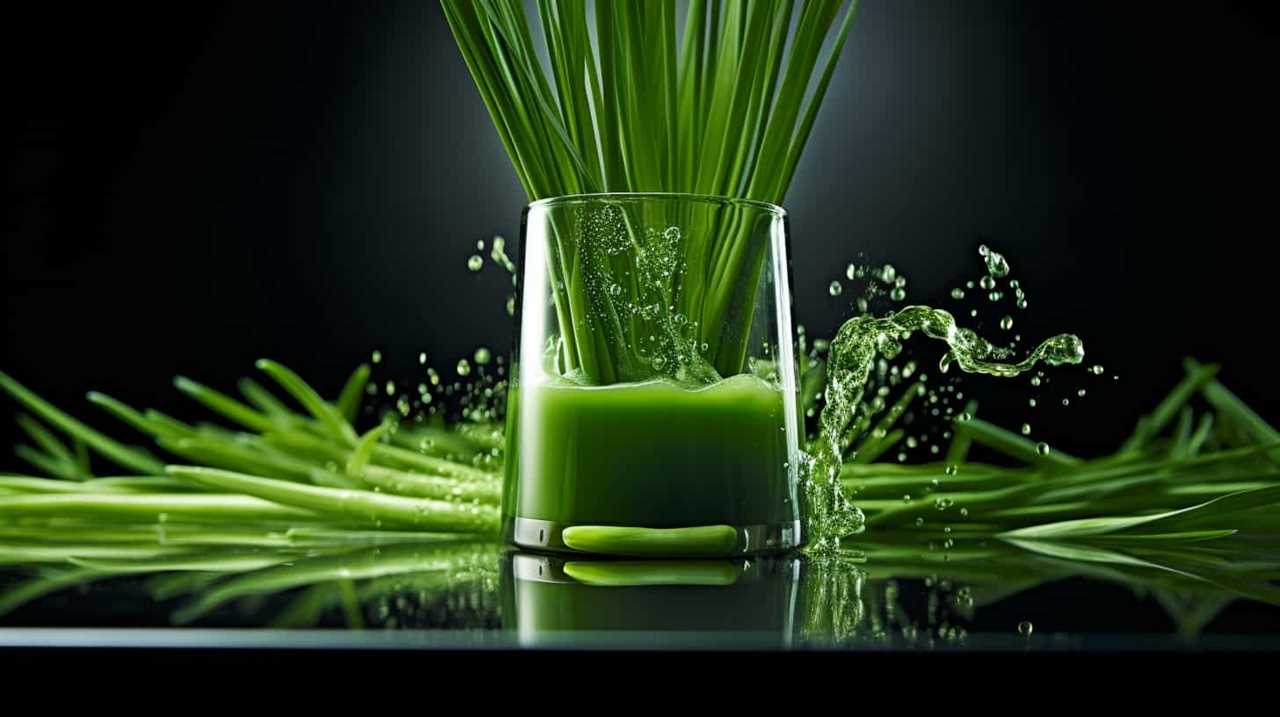
Now, let’s move on to discuss the texture changes in orange juice.
Texture Changes in Orange Juice
As we explore the texture changes in orange juice, it’s important to note that certain factors can cause it to become thicker or develop sediment. One common texture change in orange juice is pulp separation, where the pulp separates from the liquid and settles at the bottom. This can occur naturally over time, as the pulp particles become denser and sink.
Another factor that can affect the texture of orange juice is the expiration date. As orange juice ages, it may start to develop a thicker consistency and even form sediment. This is a result of the natural breakdown of the juice’s components. Therefore, it’s crucial to check the expiration date on orange juice and consume it before it reaches its expiration date to avoid any undesirable texture changes.
Mold or Growth in Orange Juice
We need to be aware of the possibility of mold or other growth occurring in orange juice. Mold can develop in orange juice if it isn’t stored properly or if it has passed its expiration date.
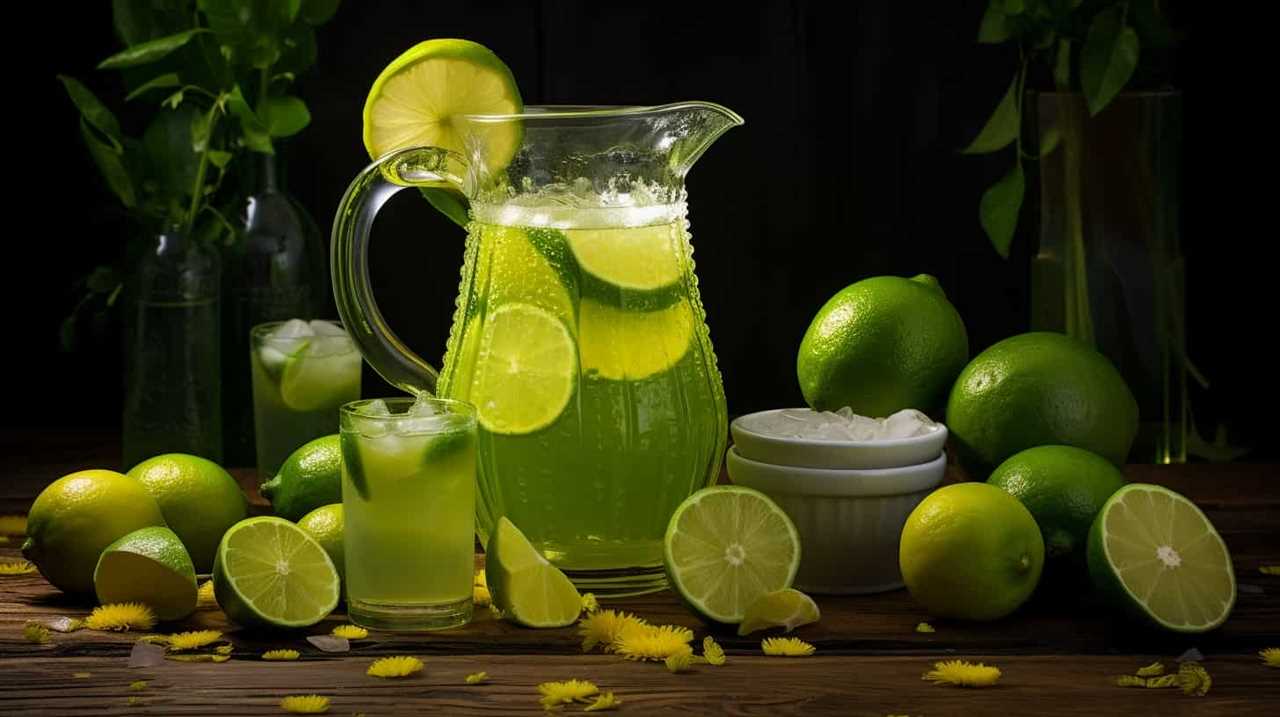
To prevent mold growth, it’s important to follow these steps:
- Store orange juice in the refrigerator at a temperature below 40°F (4°C).
- Check the expiration date on the bottle before consuming. Discard any orange juice that has expired.
- Keep the container tightly sealed to prevent air and moisture from entering, as these can promote mold growth.
Regularly inspecting orange juice for any signs of mold or unusual growth is essential. If you notice any discoloration, a strange odor, or visible mold, it’s best to discard the juice to avoid any potential health risks.
Frequently Asked Questions
Can Orange Juice Go Bad if It’s Stored in the Freezer for Too Long?
Frozen orange juice can potentially lose its nutrients and change its taste if stored in the freezer for too long. It is important to check for signs of spoilage before consuming it.
How Long Can Orange Juice Stay Fresh in the Refrigerator Once It’s Opened?
Once opened, orange juice can stay fresh in the refrigerator for about 7-10 days. To maintain its freshness, store it properly by keeping it tightly sealed and at a consistently cold temperature. If the orange juice develops an off odor, flavor, or appearance, it’s best to discard it to avoid any potential health risks. Factors like exposure to air and varying temperatures can influence how long orange juice lasts, so it’s crucial to handle it with care. Always check the expiration date as a general guide, but remember that proper storage can extend its freshness slightly. Additionally, avoid leaving the orange juice out at room temperature for extended periods, as this can significantly shorten how long orange juice lasts. Freezing the juice can be another option to extend its shelf life, but be aware that this may alter its texture and taste once thawed. By following these precautions, you can ensure your orange juice stays fresh and safe to consume.
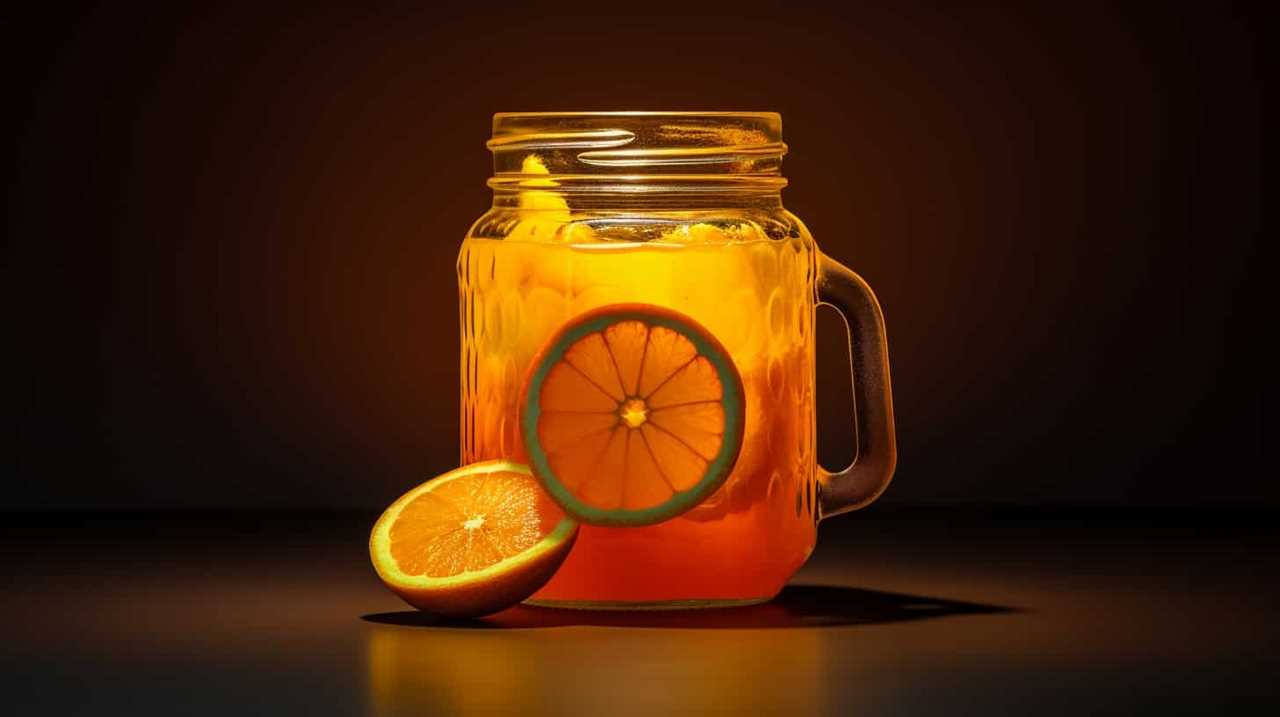
Is It Safe to Consume Orange Juice That Has Been Left Out at Room Temperature Overnight?
Left out orange juice may not be safe to drink as it can harbor harmful bacteria. Signs of spoiled orange juice include a sour smell, mold growth, and a change in color or taste.
Can Orange Juice Develop Harmful Bacteria if It’s Past Its Expiration Date but Still Looks and Smells Fine?
Orange juice can cause food poisoning if it develops harmful bacteria, even if it looks and smells fine. Signs of spoiled orange juice include a sour smell, mold growth, and a change in color or taste.
Does the Nutritional Value of Orange Juice Decrease as It Starts to Go Bad?
As orange juice goes bad, its nutritional value decreases. The longer it sits on the shelf, the more nutrients it loses. Signs of spoilage include a sour smell, off taste, and mold growth.
Conclusion
In conclusion, determining if orange juice is bad requires careful observation of color changes, strange smells, off taste, and texture changes. Just like a detective investigating a case, we must rely on our senses to detect any signs of spoilage.
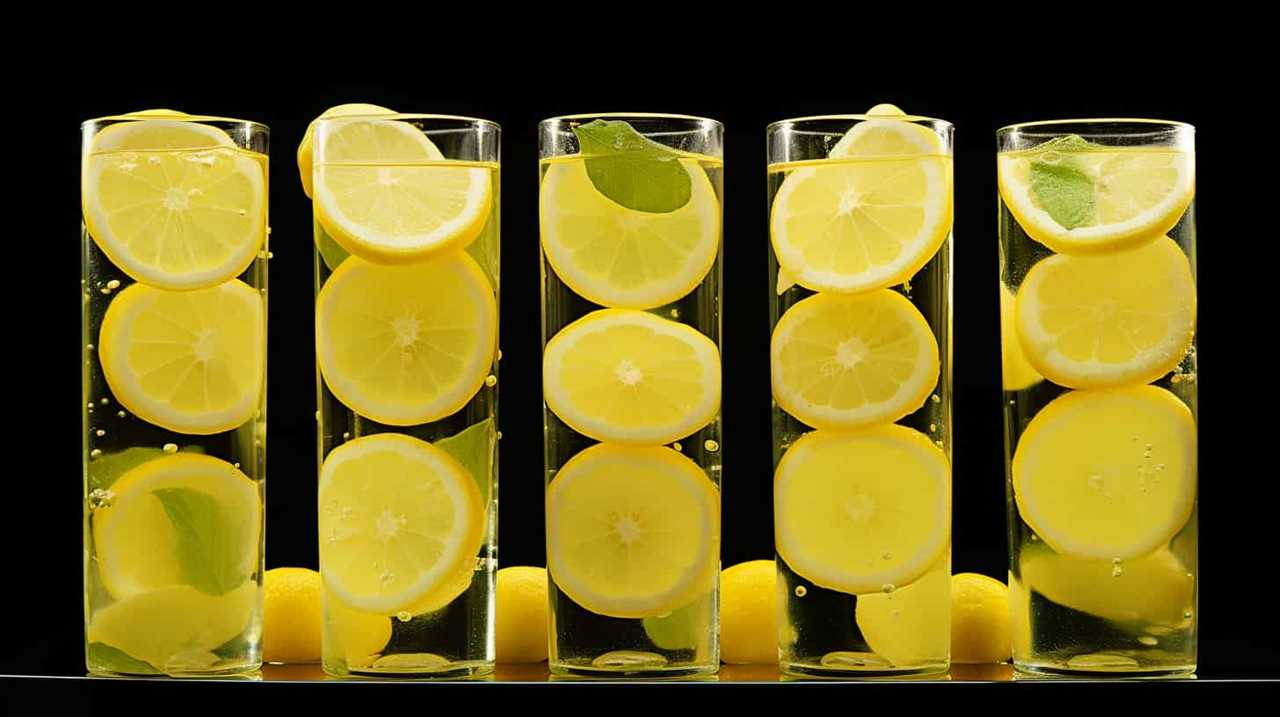
If we detect mold or growth in the orange juice, it’s a clear indication that it’s no longer safe to consume. By remaining vigilant and attuned to these indicators, we can ensure that our orange juice is always fresh and enjoyable.
Susannah expertise lies in researching and compiling evidence-based content on juicing, nutrition, and overall health. She is committed to ensuring that The Juicery World offers accurate, up-to-date, and trustworthy information to empower readers to take control of their health. Susannah’s goal is to inspire individuals to embrace juicing as a way to nourish their bodies and live their best lives.
-

 Vetted2 months ago
Vetted2 months ago15 Best Juices for Diabetics: Refreshing Options That Won’t Spike Your Blood Sugar
-

 Vetted2 months ago
Vetted2 months ago15 Best Decaf Coffee Options for Flavor Lovers Who Need a Caffeine Break
-

 Vetted2 months ago
Vetted2 months ago15 Best Espresso Ground Coffees to Elevate Your Morning Brew
-

 Vetted2 months ago
Vetted2 months ago15 Best K-Cup Coffee Pods for a Perfect Brew Every Time
-

 Vetted2 months ago
Vetted2 months ago15 Best Beans for Espresso: A Guide to Perfecting Your Brew
-

 Vetted2 months ago
Vetted2 months ago15 Best Inexpensive Espresso Machines That Brew Quality Coffee on a Budget
-

 Vetted2 months ago
Vetted2 months ago15 Best Kona Coffees to Savor the Rich Flavors of Hawaii
-

 Vetted2 months ago
Vetted2 months ago15 Best Cold Brew Coffees to Keep You Refreshed All Summer Long



